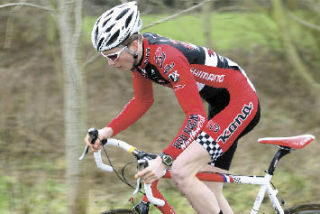Fall City cyclist Eric Emsky spent the month of January putting his pedaling skills to the test.
Emsky, who attends Mount Si High School, competed in some of the most difficult races he’s ever undertaken. He finished 47th in a World Cup cyclocross event in France on Jan. 18, then two weeks later, finished 38th in the junior division in the cyclocross World Championships, held in the Netherlands.
From Belgium, Emsky described the sport and his experiences for the Valley Record.
“Cyclocross is an odd sport,” he said. The event is a mix of road cycling and mountain biking. Races are generally short, lasting anywhere from 35 to 60 minutes, and take place on a closed circuit between two and four kilometers long.
Courses are generally unpredictable. The typical cyclocross race covers a variety of surfaces, sometimes with a concrete or paved straight lane start and finish, with perhaps open field riding, a single-track lane and even gravel in between.
“What really makes cyclocross an oddball sport is the fact that it is only held in the fall and winter months, so there is a large chance the course conditions will be muddy, frozen or simply cold,” Emsky said.
In Belgium, the Mount Si student has immersed himself in the country’s culture and history. Emsky and his teammates, all representing the United States, lived in a small town while preparing for the championships.
“The inhabitants of Belgium are tough, weathered by the rainy, grey and dreary weather of their homeland. What they lack weather-wise, they make up for in the different aspects of their lives, whether it be pride in their blue collar work, chocolate, or their nation’s sports and sportsmen,” he said.
Belgians are “cycling mad,” Emsky said. Cycling is Belgium’s second most-popular sport, surpassed only by soccer. “At the races, the spectators will range from 5 year-olds wanting to see their heroes in action to work-worn old men looking for some pure entertainment.”
Emsky qualified for the world championships based on his performances at home last year. But he knows that the best competition, and his toughest tests, lie on the other side of the Atlantic.
“The level of the average racer [in Belgium] is so much faster” than in the United States, Emsky said. “The rider placing in twentieth position of a race in Belgium is commonly faster than the fifth fastest rider hailing from the U.S.
In Europe, “the culture is so supporting of the sport,” he said.
Riders have large support crews who eagerly attend to their needs. Racers push each other to new levels of speed and stamina. Plus, there are many people who are extremely willing to pass on their own decades of experience to help train younger riders.
“The many facets and levels of support the riders receive are amazing,” Emsky said. “An American racer is extremely lucky to have access to these rare resources stateside.”
Emsky writes about his experiences on a blog at www.radracingnw.org/radblog/. He’s posted text and photos of his European racing experience.



